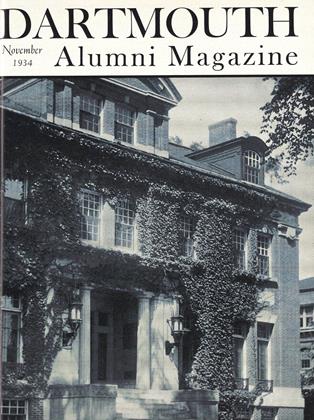THERE WERE giants in those days." The newcomer to the Dartmouth campus back in the mid-War days felt that the migration to Hanover from Framingham, Mass., or Medina, New York, or Pittsfield, New Hampshire, was a stride straight into another world. Even now it still seems that they grew them bigger, somehow, in that particular era. The tremendous varsity "D's" of the time were modest enough, stretched across the brawny chests of Gerrish and Duhamel, Barney Thielscher, Tom Cotton and Husky Merrill.
True, even those football teams drawn from a race of giants couldn't win all their games, but there was a glamour about the thing, springing from youth and utter lack of sophistication. Perhaps the war put a stop to much of that. "Cav," so the gossip ran, was a driver, a martinet, a man who minced no words. Yet no coach before or since could put the whole student body more completely under the spell of his oratory. When "Cav's" voice boomed out, alternately pleading and menacing, tomorrow became not just another Saturday but an occasion to prove once more the greatness of Dartmouth. The bonfires that followed rallies leaped closer to the skies.
The period from 1916 to 1920 saw kaleidoscopic variations in Dartmouth football. Compare the bone-crushing array that Cavanaugh was able to assemble in 1916 with the assortment of midgets that made up the S. A. T. C. team of 1918. The one fullsized man of that war-time outfit, Captain Casey Bevan, towered above his tiny brood like a mother hen sheltering her young. Bill Streng with the sailor legs and Frankie Ross were on the ends, neither one of them over five feet six. Ort Hicks, the only center on the squad, probably never once faced an opponent who didn't outweigh him from ten to forty pounds. There were some stocky lads among the backs Hoy Schultiqg and Phil Threshie and Val Grundman; but for every man of average size or better there were a couple of little fellows.
Just as the war year naturally enough thinned out the collegiate stock, so did the fall of 1919 bring back to the campus a mass of brawn and muscle. Dartmouth had a right to look to Eastern laurels that year. So too did Colgate. And when Larry Bankart brought his unbeaten Colgate team to Hanover toward the end 'of the season, the game took on all the dramatic tension of a Rose Bowl struggle. For a day the center of the football world moved into northern New Hampshire.
In advance of Colgate's arrival came stories of Gillo and Anderson and West; Gillo, the pile-driving fullback, Anderson, the amazing tactician at quarterback, and West, prospective AilAmerican tackle, who could sweep half a line aside with one thrust of his mighty arm. Dartmouth kept its collective chin up and waited. Snow fell for days; heelers patiently shovelled it off and piled up drifts two feet high along the sidelines. On the day of the game the greatest football crowd ever assembled in Hanover looked down upon that favorite landscape of sports writers, "a sea of mud."
Colgate justified all its pretty publicity with a sustained march down the field in the first quarter for a 7-0 lead. Then the tide of battle seesawed. As time passed it became apparent that two huskies in the Dartmouth line, Swede Youngstrom and Cuddy Murphy, were finding a way to care for the mighty West. Things began to happen through his tackle, while excitement grew in the stands. The top railing of the old wooden bleachers gave way and a score of undergraduates plunged headlong to the icy ground, but their mishap hardly drew a second's notice from their fellow men.
Fiction could never invent a more melodramatic climax to that day's events. As the last quarter drew to a close, a worn but grimly determined Colgate eleven clung to the ball far back in its own territory. Unable to gain, they punted, and the kick, blocked by an increasingly troublesome Youngstrom, was recovered. Another punt bounced off the Swede's chest for a second Colgate recovery in the shadow of the goal posts. A third time, with no other possible choice, they tried to kick from far back in the end zone, but this time Youngstrom gave no quarter. He blocked and recovered the ball for himself over the Colgate goal line. Jim Robertson's sharply angled placement for the extra point'bounced off the left-hand goal post and dropped inside, tying the score as the game ended.
What happened to Gillo and Anderson and West in that year's final ratings escapes the memory, but Swede Youngstrom was everybody's choice tor ail-American guard.
 View Full Issue
View Full Issue
More From This Issue
-
 Article
ArticleGRADUS AD PAMPASSUM
November 1934 By The Editors -
 Article
ArticleHANOVER BROWSING
November 1934 By Herbert F. West '22 -
 Class Notes
Class NotesClass of 1930
November 1934 By Albert I. Dickerson -
 Class Notes
Class NotesClass of 1934
November 1934 By Martin J. Dwyer Jr. -
 Class Notes
Class NotesClass of 1929
November 1934 By F. William Andres -
 Class Notes
Class NotesClass of 1914
November 1934 By Edward Leech
R.M. Pearson '20
Article
-
 Article
ArticlePresident Speaks
February 1936 -
 Article
ArticleSecond Trustee Term For Harvey P. Hood
July 1950 -
 Article
ArticleWhy Does U.S. News & World Report Rank Dartmouth First In Student Satisfaction?
December 1991 -
 Article
ArticleAnother Bear Takes Charge
Sept/Oct 2009 -
 Article
ArticleHanover Browsing
December 1949 By HERBERT F. WEST '22 -
 Article
Article1905*
May 1939 By ROBERT H. HARDING


